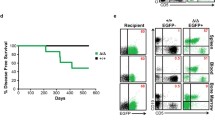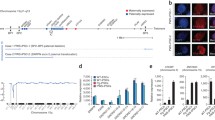Abstract.
Rett syndrome (RTT) is an X-linked dominant neurodevelopmental disorder caused by mutations in MECP2, encoding methyl-CpG-binding protein 2 (MeCP2). As female somatic cells are mosaic for expression of mutant MECP2, we performed single cell cloning of T lymphocytes from four RTT patients with MECP2 mutations to isolate cells expressing mutant MECP2. Mutant-expressing clones were present at a significantly lower frequency (P<0.0001) than wild-type clones. These results demonstrate that although MECP2 is not essential for lymphocyte growth, expression of the MECP2 mutation causes a growth disadvantage in cultured clonal T cells by reducing the response to mitogenic stimulation. Mutant MECP2 was expressed at normal transcript and protein levels, and exhibited no significant effect on acetylated histones or methyl-binding protein 3 (MBD3) levels. Since MeCP2 was predicted to silence transcription of methylated genes, we hypothesized that MeCP2 may be required for silencing imprinted or methylated gene expression. The allelic expression of three different imprinted genes (SNRPN, IPW and IGF2) was examined by RT-PCR and RFLP analysis, and demonstrated normal monoallelic expression of all RTT clones. We also examined the expression of five imprinted genes (SNRPN, IPW, NECDIN, H19 and IGF2) in RTT brain samples and observed exclusive monoallelic expression. Expression levels were also normal in MECP2 mutant-expressing T cells for IFNG, a non-imprinted, but methylated gene differentially expressed in T cells, and LINE-1 retrotransposons hypothesized to be silenced by MeCP2. The histone deacetylase inhibitor Trichostatin A did not alter SNRPN expression, but did reverse silencing of IFNG in a MECP2-mutant-expressing clone. In conclusion, our results do not support an essential role for either MeCP2 or HDAC in the silencing of several imprinted genes.
Similar content being viewed by others
Author information
Authors and Affiliations
Additional information
Electronic Publication
Rights and permissions
About this article
Cite this article
Balmer, D., Arredondo, J., Samaco, R.C. et al. MECP2 mutations in Rett syndrome adversely affect lymphocyte growth, but do not affect imprinted gene expression in blood or brain. Hum Genet 110, 545–552 (2002). https://doi.org/10.1007/s00439-002-0724-4
Received:
Accepted:
Published:
Issue Date:
DOI: https://doi.org/10.1007/s00439-002-0724-4




